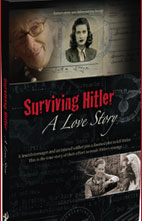
Surviving Hitler: A Love Story 2010
Distributed by Ro*co Films International, llc, 80 Liberty Ship Way, Suite 5, Sausolito, CA 94965; 415-332-6471
Produced by John-Keith Wasson
Directed by John-Keith Wasson
DVD, color and b&w, 65 min. and 55 min. versions on one disc
College - Adult
World War II; Holocaust Studies
Date Entered: 01/07/2011
Reviewed by Sheila Intner, Professor Emerita, Graduate School of Library & Information Science, Simmons College GSLIS at Mt. Holyoke, South Hadley, MAJutta Cord tells a remarkable story in this film, which is part documentary and part docudrama. Through an artful combination of her personal comments and photographs, home movies made by her husband, Helmuth, reenactments, archival film footage from many sources, and additional photographs and documents, Jutta relates how she & her parents stayed alive in Berlin even though she and her mother were Jewish, and how she continued her relationship with Helmuth, a German soldier, throughout the years of World War II.
Jutta’s experiences defy the odds. Jutta’s non-Jewish father, who aids and abets the anti-Hitler resistance, and is taken away by the Gestapo, mysteriously gets back to his former home after the war ends and is waiting there for Jutta and her mother when they return. Jutta’s Jewish mother is sent to a concentration camp, but escapes death. Identified as a Jew, Jutta goes to the Gestapo, ostensibly to seek her parents’ whereabouts, but is not sent to a concentration camp. Instead, they jail her as a political prisoner. Ultimately, she is released. Helmuth, Jutta’s sweetheart, continues serving in the army of the Third Reich after being wounded in the battle of Stalingrad. Eventually he is jailed for anti-government activity, but he escapes punishment when an Allied bombing interrupts his trial. After the war ends, Jutta and Helmuth are the first couple in Berlin to get married.
Elements of Jutta’s story beg questions: Given the mountains of photographs used in the film, why are there no photographs of Jutta or her mother wearing the star of David patch? Weren’t they required to wear it or did she choose not to show them? How did Jutta’s parents hold on to their home after being taken away by the Gestapo? Were they wealthy enough to maintain the property in absentia? Did a faithful servant or relative take care of it for them? How did Jutta avoid the horrific treatment of Jews by the Gestapo? While being jailed was surely no picnic, Jews were murdered simply for being Jewish and rarely kept alive as political prisoners with no reason. What kept her from being treated like the rest? And why, in the most terrible scene, do we see a Jewish resistance fighter whom Jutta’s parents hid in their home brought in to her interrogation, crawling on all fours like a dog, and, then, led away after she denies knowing him? Did he not give her and her parents up to the Gestapo?
In spite of these unanswered questions, Surviving Hitler is a powerful film that deserves viewers’ attention. The amount of historical documentation, especially in the longer version of the video, is worth seeing, especially in view of the growing number of people and groups claiming that the destruction of millions of Jews in World War II never happened.
Recommended.